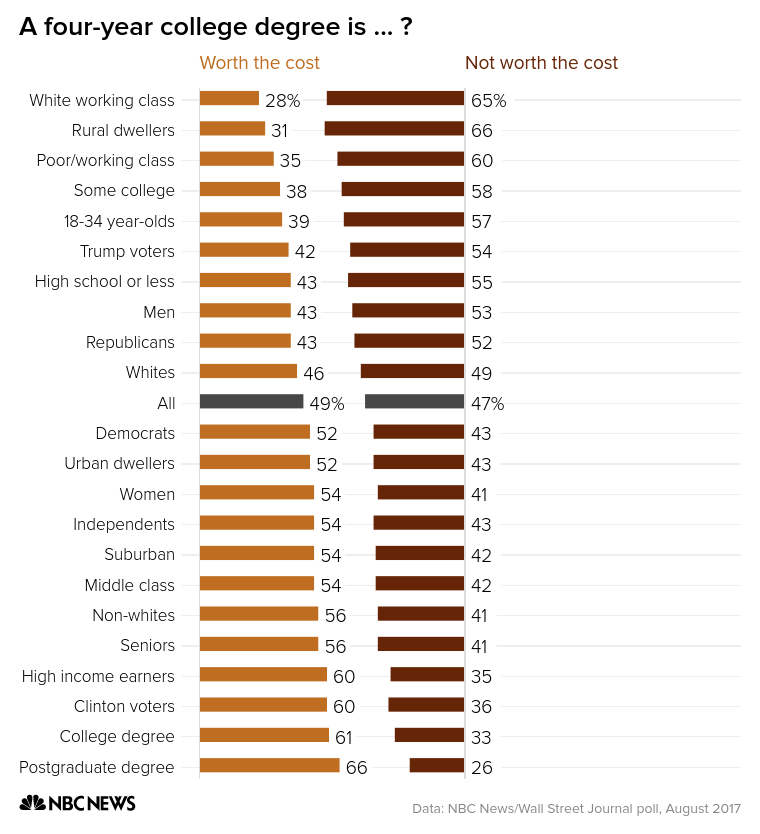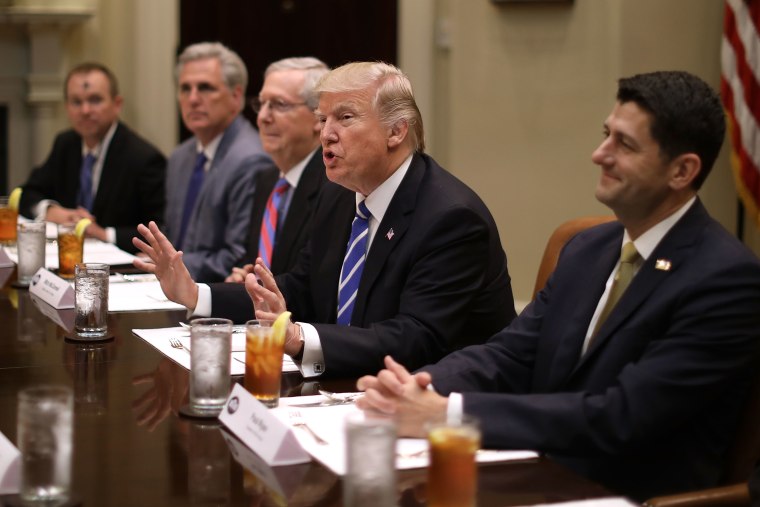First Read is your briefing from Meet the Press and the NBC Political Unit on the day's most important political stories and why they matter.
Trump gets payback against Ryan and McConnell
By itself, President Trump cutting yesterday’s spending/hurricane relief/debt limit deal with congressional Democratic leaders shouldn’t have been too surprising to observers. (After all, the move was exactly what some EXPECTED Trump’s presidency to be.)
But when you combine it with Trump’s past grievances against Speaker Paul Ryan and Senate Majority Leader Mitch McConnell — as well as the news that Trump is unlikely to make top economic adviser Gary Cohn the next Fed chair — it becomes pretty clear that Wednesday was Trump’s day of payback for August.
- Mad that McConnell and Ryan weren’t able to deliver on health care? Cutting a deal with Democrats Chuck Schumer and Nancy Pelosi certainly sends a message.
- Mad that Ryan didn’t defend Trump’s pardon of Joe Arpaio? Yesterday makes more sense.
- Mad that Cohn criticized him over his response to Charlottesville? Another message delivered.
What’s particularly striking about yesterday, however, is the reaction from GOP congressional leaders, as well as rank-and-file Republicans: They were livid, and they communicated that outrage to reporters. So what ultimately incensed them (at least publicly and so quickly) wasn’t Charlottesville, or Arpaio, or DACA – it was Trump agreeing to a three-month increase of the debt limit.
Then again, it’s not like Ryan, McConnell and other Republicans weren’t warned. Ever since Trump captured the GOP nomination in 2016, there have been three political parties in Washington — the Republican Party, the Democratic Party, and Trump Party. And yesterday was the Trump Party flexing its muscles.
The fallout from Trump’s deal with Democrats
To us, there are three immediate consequences of Trump’s move yesterday. One, it creates more distrust between him and GOP leaders. McConnell and Ryan "might put on a good face publicly and show a stiff upper lip, but each time the president embarrasses them they become marginally more likely to turn on him down the road during his darkest hours," as the Washington Post’s James Hohmann writes.
Two, it gives Democrats leverage to pass something codifying DACA (and maybe other priorities) in December. Remember, yesterday’s deal means that December will be the showdown over the debt limit, spending and the border wall, and Trump will need Democratic votes. That’s why Ryan was trying to lock in a longer extension.
And three, it potentially clears the deck for other GOP priorities — like tax reform.
Inside Trump’s deal with Democrats
Here’s NBC’s Hallie Jackson and Kasie Hunt with more on how yesterday went down. “President Donald Trump sat in the Oval Office on Wednesday, listening to his Treasury Secretary argue against a Democratic proposal to raise the government’s debt limit for just three months.”
“Steven Mnuchin, seated on a couch to the president’s right, had pushed this point before: A longer-term extension of 18 months would extend the deadline past the midterms — which would take partisan politics out of the debate, in his view. But Senate Minority Leader Chuck Schumer, D-N.Y., disagreed: He wanted something much shorter.”
“The president, in deal-making mode, had heard enough. As Mnuchin made his case, Trump cut in: He would side with Schumer, House Minority Leader Nancy Pelosi and the Democrats to make a 90-day deal to lift the debt ceiling.”
More from Jackson and Hunt: “As the meeting wound down, even the president’s own advisers were stunned by the new deal. ‘We did not know this was going to happen," one administration source said. "I don’t think anyone did.’”
And: “Shortly after the Oval Office meeting wrapped up, Trump departed the White House for North Dakota. Republican leaders returned to Capitol Hill tight lipped — Majority Leader Kevin McCarthy, R-Calif., dodging cameras, face drawn. Just over an hour earlier, Ryan had accused Democrats of playing politics with America's credit. ‘Disgraceful,’ he had said.
“But up on Air Force One after the meeting, Trump was triumphant. He didn't mention Ryan or McConnell. ‘We had a very good meeting with Nancy Pelosi and Chuck Schumer,’ the Republican president said.”
We don’t need no education: Americans split on value of a college degree
“Americans are becoming more skeptical that a four-year college education is worth the cost,” one of us writes about another result from the latest NBC/WSJ social-trends poll. The national survey “found that 49 percent of Americans agreed with the statement that a four-year degree ‘is worth the cost because people have a better chance to get a good job and earn more money over their lifetime.’ But about the same share, 47 percent, said that a degree is not worth the cost ‘because people often graduate without specific job skills and with a large amount of debt to pay off.’”

“When pollsters posed a similar question in a June 2013 CNBC survey, 53 percent of Americans said that a four-year degree is worth the cost, while just 40 percent said that it is not.”
“Part of the reason for the drop? Young people have soured significantly on the idea, even as their parents’ generation has remained comparatively bullish. Among 18-34 year olds, just 39 percent now say that a four-year degree is worth the cost, while 57 percent disagree. Just four years ago, those numbers were flipped.”
“White working class Americans also appear to have lost confidence in the value of a college degree. In 2013, about half — 49 percent — said that a college degree was not worth the cost. That’s up to 65 percent who say the same now.”
Reichert announces retirement, giving Democrats a prime pickup opportunity
On Wednesday, Rep. Dave Reichert, R-Wash., announced that he wouldn’t seek re-election, which hands Democrat a key pickup opportunity in this district that Hillary Clinton won in 2016. Democrats need to pick up 24 seats to win back control of the House, and Reichert’s seat is an important one for them to hit that number.
What are the GOP’s prospects for keeping the seat? Just take it from Reichert. “I’d certainly like to see a Republican keep the district. I think it’s going to be hard,” he told the Seattle Times.
How NBC is covering Irma
“NBC News is deploying the full resources of its expansive network and cable network to cover Hurricane Irma, following suit of its comprehensive coverage for historic Hurricane Harvey last week. The network is covering the storm from every angle with an unmatched presence on the ground,” per a release.
“Lester Holt leads NBC News’ coverage of Hurricane Irma and will anchor ‘NBC Nightly News’ on the ground beginning tomorrow... Al Roker — who has decades of unrivaled experience in weather reporting — will be live in the field beginning tomorrow night on ‘NBC Nightly News with Lester Holt’ to share the latest on Hurricane Irma.”
"Meteorologist Dylan Dreyer will join ‘TODAY’ in studio tomorrow morning and travel to report in the field after the broadcast. Meteorologist Bill Karins and weather anchor Dave Price will forecast the latest on Hurricane Irma for NBC News broadcasts and MSNBC programs in-studio."



